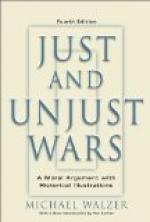The North trial was Mount Hope’s one vital sensation. Day after day the courtroom was filled with eager perspiring humanity, while in their homes, on the streets, and in the stores men talked of little else. As for North himself, he was conscious of a curious sense of long acquaintance with the courtroom; its staring white walls and crowded benches seemed his accustomed surroundings, and here, with a feeling that was something between fear and weariness, he followed each stage of the elaborate game Judge Belknap, for the defense, and Moxlow, for the prosecution, were playing, the game that had his life for its stake.
When court adjourned, always in the twilight of those mid-winter afternoons, there were his brief comforting interviews with Elizabeth; and then the long solitary evenings in his cell; and the longer nights, restless and disturbed. The strain told fearfully on his vigor of body and mind, his face under imprisonment’s pallid mask, became gaunt and heavily lined, while his eyes sunk deep in their sockets.
At first he had not believed that an innocent man could be punished for a crime of which he had no knowledge; he was not so sure of this now, for the days slipped past and the prosecution remained firmly intrenched behind certain facts which were in their way, conclusive. He told himself with grim humor that the single weak strand in the rope Moxlow was seeking to fit about his neck was this, that after all was said and proved, the fact remained, he had not killed Archibald McBride!
When the last witness for the state had been examined, North took the stand in his own behalf. His cross-examination was concluded one dull February day, and there came a brief halt in the rapid progress of the trial; the jury was sent from the room while Moxlow and Belknap prepared instructions and submitted them to the court. The judge listened wearily, his sunken cheek resting against the palm of his thin hand, and his gaze fixed on vacancy; when he spoke his voice was scarcely audible. Once he paused in the middle of a sentence as his glance fell on the heavy upturned face of his son, for he saw fear and entreaty written on the close-drawn lips and in the bloodshot eyes.
A little later in the twilight North, with the sheriff at his elbow, walked down the long corridor on his way to the jail. The end was close at hand, a day or two more and his fate would be decided. The hopelessness of the situation appalled him, stupified him. The evidence of his guilt seemed overwhelming; he wondered how Elizabeth retained her faith in him. He always came back to his thought of her, and that which had once been his greatest joy now only filled him with despair. Why had he ever spoken of his love,—what if this grim farce in which he was a hapless actor blundered on to a tragic close! He would have made any sacrifice had it been possible for him to face the situation alone, but another life was bound up with him; he would drag her down in the ruin that had overtaken him, and when it was all past and forgotten, she would remember,—the horror of it would fill her days!




